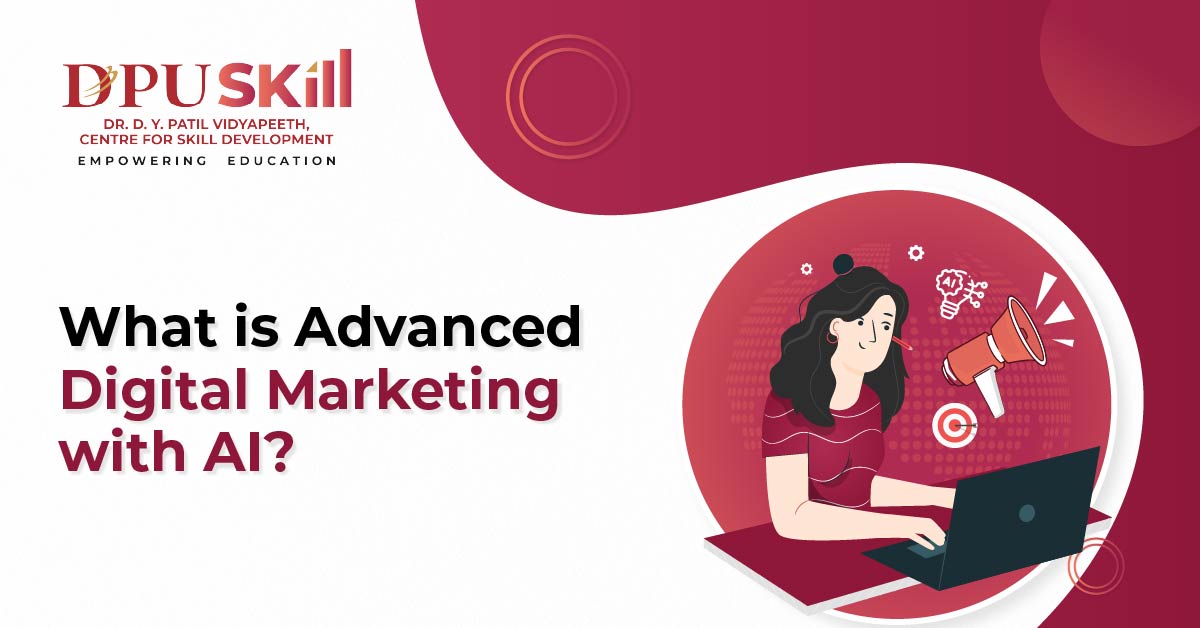
AI in digital marketing uses artificial intelligence capabilities such as data collection, natural language processing, machine learning, and data analysis to get customer insights and automate marketing tasks and decisions.
The advantage of AI is that it will help you gain insights into customer behaviors at speed by harvesting vast amounts of data. These can be used to respond to and tailor a customer’s needs depending on their actions and preferences. AI is also able to adapt and improve over time using feedback and new data.
Artificial intelligence offers great opportunities for marketers to be more effective and personalized. This means customers get relevant content that can be triggered by actions on a site, an ad, or a branded message.
But AI doesn’t replace the roles and efforts of humans! It is a technology that complements and enhances those, but it requires human skills to use it effectively.
AI is crucial in digital marketing as it significantly enhances the customer experience. By leveraging AI, marketers can provide highly personalized content, which not only engages visitors but also converts them into leads. Additionally, AI plays a vital role in boosting customer retention and loyalty by continuously optimizing interactions and delivering tailored experiences. This ultimately leads to higher customer satisfaction and improved brand loyalty.
Personalized Content Delivery
Utilize AI to analyze customer data and behavior, allowing you to create and deliver highly personalized content. AI-driven tools can recommend products, tailor messaging, and customize user experiences, leading to higher engagement and conversion rates.
Predictive Analytics
Implement AI-powered predictive analytics to forecast trends, customer behaviors, and market shifts. This enables marketers to make data-driven decisions, optimize campaigns, and anticipate customer needs, resulting in more effective and timely marketing strategies.
Automated Customer Interactions
Use AI-driven chatbots and virtual assistants to automate customer interactions, providing instant responses and support. These tools can handle routine queries, guide users through the buyer journey, and free up human resources for more complex tasks, enhancing overall efficiency.
Enhanced Ad Targeting
Leverage AI to refine ad targeting by analyzing vast amounts of data, including user demographics, behavior, and preferences. This allows for more precise targeting, ensuring ads reach the right audience at the right time, and maximizing ROI on advertising spend.
Sentiment Analysis and Social Listening
Incorporate AI-powered sentiment analysis and social listening tools to monitor brand mentions and customer opinions across social media platforms. By understanding customer sentiment in real time, marketers can quickly address concerns, adapt strategies, and capitalize on positive feedback, ultimately improving brand reputation and customer satisfaction.
Enhanced Personalization
AI enables the creation of highly personalized marketing campaigns by analyzing user data and behavior. This leads to tailored content, product recommendations, and offers that resonate more with individual customers, improving engagement and conversion rates.
Improved Decision-Making
AI-driven analytics provide marketers with deep insights into customer behavior, market trends, and campaign performance. These insights empower data-driven decision-making, allowing for more effective strategy adjustments and better overall outcomes.
Automation and Efficiency
AI automates repetitive tasks such as email marketing, social media posting, and customer segmentation. This not only saves time but also ensures consistency and accuracy, enabling marketers to focus on more strategic activities.
Optimized Ad Targeting
AI enhances ad targeting by analyzing vast amounts of data to identify the most relevant audiences. This leads to more precise ad placements, higher click-through rates, and improved return on investment (ROI) for advertising spend.
Predictive Analytics
AI's predictive capabilities allow marketers to anticipate customer needs and behaviors. By forecasting trends and outcomes, businesses can proactively tailor their marketing strategies to meet future demands, staying ahead of the competition.
Real-Time Customer Support
AI-powered chatbots and virtual assistants provide instant, 24/7 customer support. This improves customer satisfaction by addressing queries promptly and freeing up human resources for more complex issues.
Cost-Effective Campaigns
AI helps optimize marketing budgets by identifying the most effective channels, content, and tactics. This ensures that resources are allocated efficiently, reducing waste and maximizing the impact of marketing efforts.
amounts of data from various sources, providing a deeper understanding of customer preferences, pain points, and motivations. This knowledge enables more targeted and effective marketing strategies.
Enhanced Content Creation
AI can assist in content creation by generating ideas, writing copy, and even producing visuals based on audience preferences. This streamlines the content creation process and ensures that the content aligns with customer interests.
AI-Powered Digital Marketing Strategist
Develop and implement digital marketing strategies that leverage AI tools and technologies. You'll work on creating personalized marketing campaigns, optimizing customer experiences, and driving business growth using AI-driven insights.
Marketing Automation Specialist
Focus on automating marketing processes using AI tools. You'll design, manage, and optimize automated campaigns, improving efficiency and effectiveness in reaching target audiences with minimal manual intervention.
AI-Driven Content Strategist
Create and manage content strategies that utilize AI for personalization and optimization. This role involves using AI tools to analyze audience data, predict trends, and generate content that resonates with specific customer segments.
Data Analyst for Digital Marketing
Use AI and machine learning algorithms to analyze vast amounts of marketing data. This role involves identifying patterns, predicting customer behavior, and providing actionable insights to improve marketing efforts.
Digital Marketing Manager with AI Expertise
Oversee digital marketing campaigns with a focus on integrating AI technologies. You'll manage teams, allocate resources, and ensure that AI tools are effectively used to enhance campaign performance and achieve business objectives.
Customer Experience Manager
Leverage AI to enhance customer experiences across digital platforms. This role involves using AI-driven tools to understand customer journeys, optimize touchpoints, and ensure high levels of customer satisfaction and loyalty.
AI-Enhanced SEO Specialist: Use AI tools to optimize website content and structure for search engines. You'll focus on improving rankings by analyzing data, predicting keyword trends, and implementing AI-driven SEO strategies.
Social Media Manager with AI Expertise
Manage social media campaigns using AI tools for content scheduling, sentiment analysis, and audience targeting. This role involves using AI to enhance engagement, monitor brand reputation, and improve social media ROI.
AdTech Specialist
Work with AI-driven advertising technologies to optimize ad campaigns. This includes using programmatic advertising platforms, real-time bidding, and AI-powered targeting to maximize ad effectiveness.
Digital Transformation Consultant
Guide businesses in adopting AI technologies within their digital marketing strategies. You'll help organizations leverage AI to enhance marketing efficiency, customer engagement, and overall business performance.
How important is AI in advanced digital marketing?
AI plays a crucial role in advanced digital marketing by enabling predictive analytics, automating customer interactions through chatbots, optimizing ad spend through programmatic advertising, and enhancing personalization by analyzing large datasets to predict user behavior.
What is the role of data analytics in advanced digital marketing?
Data analytics allows marketers to track and measure campaign performance in real time, identify trends, optimize strategies, and make informed decisions. It’s essential for understanding customer behavior, segmenting audiences, and increasing the effectiveness of marketing efforts.

Discover DPUSkill, India’s No.1 platform for upskilling professionals. Boost your career with expert-led courses and global certifications.
Read More
Discover how cybersecurity is revolutionizing industries like healthcare, finance, retail, and education, protecting data and ensuring operational continuity.
Read More
Discover how Agile project management boosts healthcare efficiency, adaptability, and patient care with real-world applications and proven benefits.
Read More